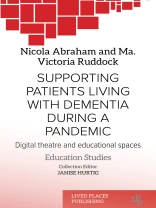How did a group of higher education applied theatre placement students learn to connect with patients living with dementia, in an acute hospital setting, during a global pandemic? How did they navigate the liminal spaces of inhabiting a virtual space while striving for real-life presence and an equality of learning and knowledge exchange?
In this book, authors and project leaders Dr Nicola Abraham Ph D and Ma. Victoria Ruddock BSN present narratives and anecdotal examples of how the COVID-19 pandemic impacted the learning of these placement students and how they adapted the learning expectations of the project in order to account for the liminality of combining virtual and in-person space inhabitation.
Through stories and reflections from the project the authors explore the meaning of a pedagogy of reciprocity and ways of navigating uncertainty. They discuss the essential need for horizontal team structures to enhance learning experiences and consider the uses of transmedia communication tools.
Cuprins
Learning objectives
Introduction
1: Acute ambitions to be yourself (I)
Assignment suggestion: Transmedia facilitation and creative practice
2: Playful ageing (us)
Assignment suggestion: Horizonal teamwork task
3: Reciprocity and uncertainty (we)
Assignment suggestion: Reciprocity and improvisation
Assignment suggestion: Responding to uncertainty
Conclusion
Recommended further reading
Despre autor
Dr Janise Hurtig is an educational anthropologist and community educator and researcher. Her teaching and writing take place at the intersections of adult and popular education, gender and feminism, community development and social change in the Chicago area and in Venezuela. Janise received her Ph.D. in Anthropology from the University of Michigan. She is currently part-time faculty in De Paul University’s School for Continuing and Professional Studies, coordinator of the Community Writing Project, and an adult educator at the Howard Area Community Center.












